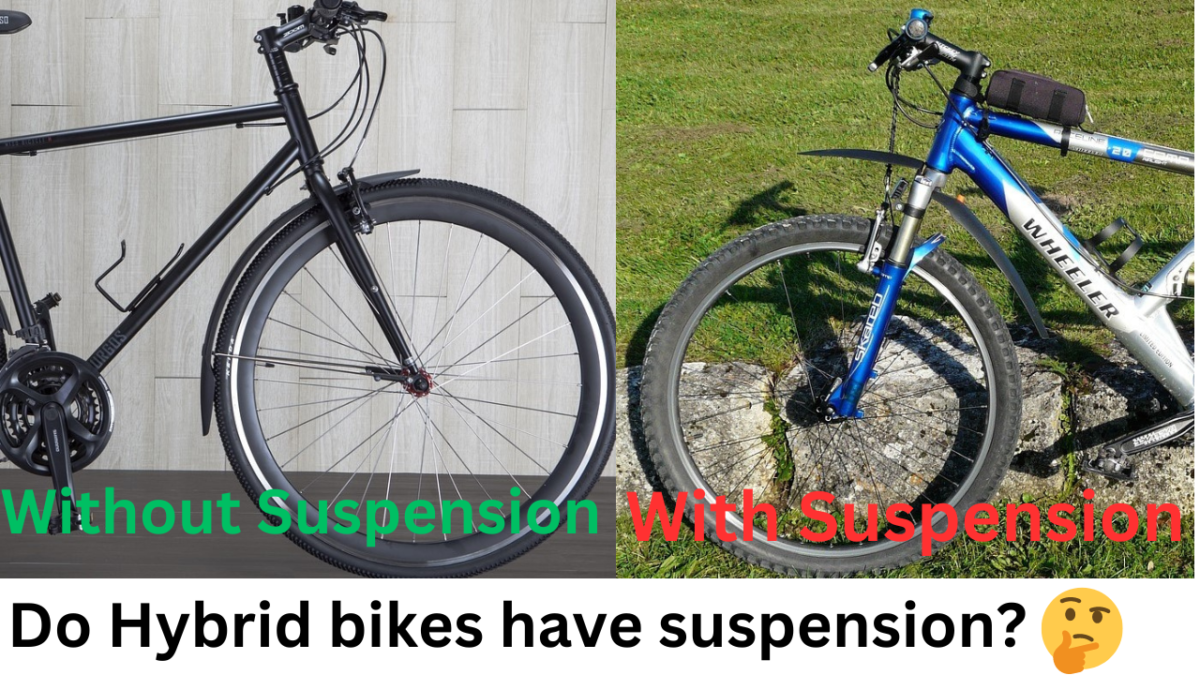When I was buying my first hybrid bike I was confused as to whether I should buy a hybrid bike with suspension or not, I ended up buying a hybrid bike without suspension, and it was perfect for me.
Depending on your riding purpose and the terrain you ride on, if you planning to ride on rough terrain you will need a suspension bike, and if you are riding on flat pavement roads, then you need a bike without suspension.
In order to consider hybrid bikes with or without suspension, first you need to know what is the purpose of a hybrid bike and why a hybrid bike with or without suspension makes a huge difference in your riding experience.
In this article, I will break down their intended purposes, and the role suspension plays in enhancing comfort and performance. we will also be looking at the pros and cons of hybrid bikes with and without suspension, and discuss if it is suitable for you or not, so let’s get started.
Table of Contents
Do hybrid bikes have suspension?
Yes and No, Some hybrid bikes have suspension and some don’t, but it depends on the specific model and intended use, Hybrid bikes with suspension are built to ride on rough terrain, and non-suspension hybrids are built to ride on paved roads.
Hybrid bikes are designed to combine the features of road bikes and mountain bikes, offering a versatile option for various terrains and riding styles.
Some hybrid bikes come with front suspension forks, which help absorb shocks and provide a smoother ride on rough surfaces.
This type of suspension is commonly found in hybrid bikes that are more geared toward off-road or gravel riding.
However, not all hybrid bikes have suspension.
Many hybrid bikes are designed with a rigid fork, which means they do not have any suspension components.
These bikes prioritize efficiency and speed on paved roads and smooth surfaces.
The decision to include suspension or not depends on the rider’s preferences and the type of terrain they plan to ride on.
If you anticipate encountering rough or uneven surfaces frequently, a hybrid bike with front suspension might be a good choice.
On the other hand, if you primarily ride on smooth roads or bike paths, a rigid fork may be more suitable as it offers better energy transfer and responsiveness. Ultimately, it’s important to consider your riding style, terrain, and personal preferences when choosing a hybrid bike with or without suspension.
Understand how suspension works on hybrid bikes?
Hybrid bikes are designed to provide a balance between road and off-road riding.
They typically feature a front suspension fork, which helps absorb shocks and vibrations from uneven terrain.
The front suspension fork consists of several key components.
It includes a set of telescopic tubes that slide into each other, known as stanchions.
These stanchions are connected to the bike’s frame and allow the fork to move up and down. Inside the division, there is a spring mechanism, usually in the form of coil springs or air springs, that helps absorb impacts.
When you encounter bumps or rough surfaces while riding, the front wheel moves up and down. The suspension fork compresses under the force of the impact, absorbing the shock and preventing it from transferring directly to your hands and arms.
This helps reduce fatigue and discomfort during longer rides.
Damping is achieved through various mechanisms such as hydraulic or mechanical systems. The amount of suspension travel determines how much the fork can compress and absorb impacts.
Hybrid bikes typically have shorter travel compared to mountain bikes, ranging from around 50mm to 80mm.
This is because hybrid bikes are designed for smoother surfaces with occasional bumps, rather than aggressive off-road trails. It’s important to note that not all hybrid bikes come with suspension forks.
Some models may have rigid forks, which do not have any suspension mechanism. Rigid forks are lighter and more efficient for smooth road riding but may not provide as much comfort on rough terrain.
Is suspension suitable for hybrid bikes?
Again, it depends on the purpose and terrain of the rider that you intend to ride on.
Suspension is indeed suitable for hybrid bikes, and it can significantly enhance the riding experience.
Hybrid bikes are designed to be versatile and capable of handling a variety of terrains, including both paved roads and off-road trails. Suspension systems on hybrid bikes help to absorb shocks and vibrations, providing a smoother and more comfortable ride.
The commonly found on hybrid bikes is a front suspension (also known as a suspension fork) Many hybrid bikes come equipped with front suspension forks.
These forks have built-in shock absorbers that are located in the front of the bike, typically above the front wheel. Front suspension helps to absorb impacts from bumps, potholes, and uneven surfaces, making the ride more comfortable and reducing fatigue.
If you frequently encounter rough or uneven surfaces, such as gravel paths or trails with rocks and roots, a hybrid bike with suspension can greatly improve your comfort and control.
The Downside of Having The Front Suspension
It’s worth noting that adding suspension to a bike can increase its weight and cost.
If you primarily ride on smooth pavement or prefer a lighter bike for commuting or fitness purposes, you may opt for a rigid (non-suspension) hybrid bike instead.
Ultimately, the choice between a suspended or rigid hybrid bike comes down to personal preference and intended use.
If your goal is to commute, fitness and urban riding then go with a non-suspension hybrid bike.
If you are looking for a versatile bike that can handle many different surfaces, including paved roads then suspension hybrid bikes will be best suitable for you.
Why do some hybrid bikes have no suspension?
While some hybrid bikes do come with suspension, others are designed without it.
There are a few reasons why manufacturers offer hybrid bikes without suspension:
Efficiency and Speed: Bikes without suspension tend to be lighter and more efficient, making them ideal for riders who prioritize speed and agility. The absence of suspension components reduces the overall weight of the bike, allowing for faster acceleration and easier maneuverability on smooth surfaces like roads or bike paths.
Cost: Suspension systems can add complexity and cost to a bike. By omitting suspension, manufacturers can produce more affordable hybrid bikes that are accessible to a wider range of riders. Bikes without suspension are often more budget-friendly, making them a popular choice for commuters or casual riders who don’t require the extra cushioning provided by the suspension.
Maintenance: Suspension systems require regular maintenance and occasional servicing to ensure optimal performance. Bikes without suspension have fewer moving parts, which means less maintenance is required. This can be appealing to riders who prefer a low-maintenance bike or those who primarily ride on well-paved surfaces.
Riding Conditions: Hybrid bikes without suspension are well-suited for riders who primarily stick to smooth roads or paved bike paths. If you don’t encounter rough or uneven terrain frequently, the added comfort and shock absorption of suspension may not be necessary.
It’s important to note that even without suspension, hybrid bikes often have features like wider tires and a more relaxed geometry compared to road bikes, providing some level of comfort and stability on various surfaces.
the decision between a hybrid bike with or without suspension depends on your riding preferences, the type of terrain you’ll encounter, and your budget.
FAQs
Can you add front suspension on hybrid bikes?
Hybrid bikes are popular for their versatility, making them a great choice for various terrains and riding styles. However, one aspect where hybrid bikes often lag behind is their lack of suspension. Without front suspension, riders may experience discomfort and fatigue, especially when tackling rough or uneven surfaces. Thankfully, there is a potential solution to this drawback. Many hybrid bikes are designed with a rigid fork, but it is possible to retrofit a front suspension fork onto your hybrid bike to enhance its performance and improve your overall riding experience.
Why do road bikes have no suspension?
The absence of suspension on road bikes is mainly due to the specific purpose and design of these machines. Road biking emphasizes efficiency, speed, and endurance, and suspension systems add unnecessary weight and reduce the energy transfer between the rider and the road. A suspension system, typically found on mountain bikes, functions to absorb impact and provide smoother rides on rough terrains, which are not prevalent on well-paved roads. By eliminating suspension components, road bikes can ensure optimal power transfer, allowing every ounce of pedaling effort to be converted into forward motion. This results in a highly responsive and efficient riding experience, essential for long-distance rides, races, and high-speed cruising. In conclusion, the absence of suspension on road bikes is a deliberate design choice that maximizes performance and efficiency for the specific demands of road cycling.
Do all hybrid bikes have front suspension?
The simple answer is no, not all hybrid bikes come equipped with front suspension. Hybrid bikes, as the name suggests, are a combination of road bikes and mountain bikes, designed to offer a versatile riding experience on both paved roads and off-road trails. While some hybrid bikes do feature front suspension, known as a suspension fork, it is not a mandatory component for this type of bicycle. In fact, many riders prefer a rigid fork on their hybrid bike, as it reduces weight, improves efficiency on smooth surfaces, and keeps overall costs down. However, for those who plan on tackling rough terrains or bumpy roads, a hybrid bike with front suspension can provide added comfort and control, absorbing shocks and vibrations to enhance the riding experience. Ultimately, the decision to go for a hybrid bike with or without front suspension depends on individual preferences and intended usage.
Conclusion
Some hybrid bikes come with front suspension, and most hybrid bikes do not have suspension, As you already know, hybrid bikes are a combination of road bikes and mountain bikes.
Hybrid bikes with suspension are built to ride on rough terrain, and hybrid bikes with rigid forks are built for paved roads and urban riding.
Buying hybrid bikes with suspension or without, totally depends on you and your riding purpose and the terrain you are planning to ride on. Before you buy a hybrid bike ask yourself what is the purpose of buying a hybrid bike, I hope you have found the answers to your questions in this article.
Resource






